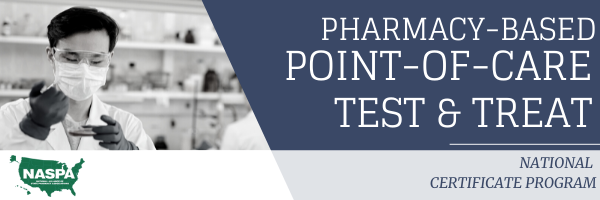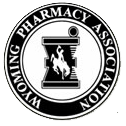NASPA’s Pharmacy-based Point-of-Care Test & Treat Certificate Program
Jun 03, 2022 1:00PM—5:00PM
Location
Holiday Inn Cody at Buffalo Bill Village

Point-of-care testing empowers clinicians to use effective, fast technology to aid their decision making at the “point-of-care” to improve patient health. Pharmacy-based point-of-care testing utilizes CLIA-waived (Clinical Laboratory Improvement Amendments -waived) tests that offer near immediate results in non-laboratory settings. Pharmacists and pharmacies are increasingly offering this public health service to promote prevention, early detection, and disease management.
Program note: This program is not tailored to Wyoming state law. In Wyoming, pharmacists are exempt from laboratory testing requirements only for CLIA-waived tests that have been approved by the FDA for home use. Nothing in this program shall constitute legal advice, and pharmacists are advised to seek legal counsel prior to undertaking a point-of-care testing program in their pharmacy or entering into any collaborative practice agreements. This program does not meet the requirements for Florida Test & Treat. Please contact NASPA for information about our Florida specific program.
Registration Rates
Member Pharmacist: $200
Non-Member Pharmacist: $300
Member Technicians: $150
Non-Member Technicians: $240
Faculty
Tonja Woods, PharmD
Associate Dean and Clinical Professor
University of Wyoming School of Pharmacy
Activity Description
Point-of-care test and treat empowers clinicians to use effective, fast technology to aid their decision making at the “point-of-care” to improve patient health. Pharmacy-based point-of-care testing utilizes CLIA-waived (Clinical Laboratory Improvement Amendments -waived) tests that offer near immediate results in non-laboratory settings. Pharmacists and pharmacies are increasingly offering this public health service of test and treat to promote prevention, early detection, and disease management.
Program Features
- Practical, hands-on training in point-of-care testing and treatment in at least 12 disease states
- 20 credit hours of ACPE-accredited continuing education
- Unique dual home study and in-person structure
- Access to and training on the interactive, web-based education platform
- Instructor training necessary to train others on the program
Activity Description
The NASPA Pharmacy-based Point-of-Care Test & Treat National Certificate Program provides an opportunity to gain the skills and information necessary to develop a testing program such as influenza, Group A Streptococcus, HIV, Hepatitis C, coronaviruses, and chronic diseases. The target audience for the certificate program is pharmacists, pharmacy technicians, student pharmacists, academia, and pharmacy association staff. While the program is primarily designed for pharmacists, non-pharmacists interested in point-of-care test and treat are also welcome to complete the program.
The 20-hour ACPE-accredited certificate program includes comprehensive material regarding key disease states, physical assessment, point-of-care tests and treatment, and business models through:
- 16 hours of home study
- 4 hours of live training
Participants take an online assessment after each of the 12 modules of home study, in addition to a cumulative assessment (must pass 70% within three attempts), and then their proficiency to conduct physical assessments and offer point-of-care testing services is assessed in the live/virtual training. Upon successful completion of both portions of the program and all program evaluations, participants are awarded a certificate of completion and pharmacists can receive 20 hours of Continuing Pharmacy Education (CPE) credit.
Learning Objectives
At the completion of this activity, the pharmacist will be able to:
- Identify opportunities for expanding patient-centered services in pharmacy settings, using point-of-care testing and treatment.
- Discuss the value and limitations of patient reported symptoms, medical history, and drug allergies.
- Describe and perform the following physical assessments, when appropriate to patient care: Blood Pressure, Pulse, Respiratory Rate, Oxygenation, and Cervical Lymph Node Inspection
- Describe and perform the following specimen collections used in point of care testing: Throat swab, and Nasal swab
- Identify characteristics of exemplar infectious diseases (e.g. influenza, Group A Streptococcus, Human Immunodeficiency Virus, Hepatitis C, Coronaviruses) regarding: Causative agents, Transmission, Immunizations, Symptoms and Presentation, Appropriate treatment, Point-of-Care testing.
- Define and contrast the following terms as they relate to point-of-care testing in pharmacies: CLIA, CLIA-waived, Collaborative Agreement, Protocol, Prescribe, Diagnose.
- Explain the value and limitations of Point-of-Care Tests, including rapid diagnostic tests, and list the steps a pharmacist can take to improve test performance.
- Apply all information to patient-specific cases based on common pharmacy-based patient interaction.
At the completion of this activity, the pharmacy technician will be able to:
- Identify opportunities for expanding patient-centered services in pharmacy settings, using point-of-care testing and treatment.
- Discuss the value and limitations of patient reported symptoms, medical history, and drug allergies.
- Describe and perform under the supervision of a pharmacist the following physical assessments, when appropriate to patient care: Blood Pressure, Pulse, Respiratory Rate, Oxygenation, and Cervical Lymph Node Inspection
- Describe and perform the following specimen collections used in point of care testing: Throat swab, and Nasal swab
- Identify characteristics of exemplar infectious diseases (e.g. influenza, Group A Streptococcus, Human Immunodeficiency Virus, Hepatitis C, Coronaviruses) regarding: Causative agents, Transmission, Immunizations, Symptoms and Presentation, and Point-of-Care testing.
- Define and contrast the following terms as they relate to point-of-care testing in pharmacies: CLIA, CLIA-waived, Collaborative Agreement, Protocol, Prescribe, Diagnose.
- Explain the value and limitations of Point-of-Care Tests, including rapid diagnostic tests.
CPE Credit: Home Study plus Live Training
This course offers 20 hours of ACPE CE (16 home study, 4 live training)
Students take an online assessment after each of the 12 modules of home study, in addition to a cumulative assessment (must pass 70% within three attempts), and then their proficiency to conduct physical assessments and offer point-of-care testing services is assessed in the live training. Upon successful completion of both portions of the program and all program evaluations, participants are awarded a certificate of completion and can receive 20 hours of Continuing Pharmacy Education (CPE) credit.
Please click here for a detailed outline of all 12 modules.
Target Audience
This course provides pharmacists, pharmacy technicians, and student pharmacists with the skills necessary to develop a testing program for influenza, Group A streptococcus, HIV, hepatitis C, and Coronavirus.
ACPE Accreditation Information
The Michigan Pharmacists Association is accredited by the Accreditation Council for Pharmacy Education as a provider of continuing pharmacy education. The home study portion of the program is approved for 16 contact hours and the live training is approved for 4 contact hours of continuing pharmacy education credit. Credit is only awarded for completion of the entire 20 contact hour program. Credit must be claimed within 30 days of completing the program.
Pharmacy-based Point-of-Care Test & Treat National Certificate Program
ACPE UAN: 0112-0000-22-200-B04-P/T
Activity Type: Practice-based
Target Audience: Pharmacists and pharmacy technicians in all practice settings
Release Date: January 3, 2022
Expiration Date: January 3, 2025
Contact Hours: 20.0
Cancellation Policy
If you have questions about this program please contact director@wpha.net.
Claiming Credit
Continuing pharmacy education (CPE) credit will be awarded for the certificate training course only. This is a Certificate Program and is primarily constructed to instill, expand or enhance practice competencies through the systematic achievement of specified knowledge, skills, attitudes and performance behaviors.
Successful completion of the live/virtual seminar component involves passing the final exam with a grade of 70 percent or higher and demonstrating proficiency in diagnostic testing techniques. Successful completion of the self-study component involves passing the self-study assessment questions with a grade of 70 percent or higher. Credit is only awarded for completion of the entire 20 contact hour program. Credit must be claimed within 60 days of completing the program (no exceptions). Attendance and participation are required before obtaining CPE credit. Partial credit will not be awarded.
CPE Monitor, is a national, collaborative effort by the Accreditation Council for Pharmacy Education (ACPE) and the National Association of Boards of Pharmacy (NABP) to provide an electronic system for pharmacists and pharmacy technicians to track their completed PCE credits. This system allows pharmacists and pharmacy technicians to log into a comprehensive electronic profile to access information about their completed CPE. All ACPE-accredited providers will be required to use this system. CPE Statements of Credit will no longer be mailed.
All continuing education credits provided by the Michigan Pharmacists Association (MPA) will be uploaded to the CPE Monitor by Lecture Panda. Lecture Panda is a platform that MPA utilizes to submit your CPE credits. You can access all certificate program materials – learning modules, PowerPoint slides, additional learning materials, assessments, and evaluations in this platform. As soon as you complete your evaluation and other instructions, it is validated and automatically sent to CPE Monitor for accreditation so there is no wait time to receive credit. After CPE credits are processed by ACPE and NABP, pharmacists and pharmacy technicians are able to log into their NABP e-Profile and view all of their completed ACPE-accredited CPE credit.
In order to process CPE credits, please provide Lecture Panda with your correct NABP e-Profile ID number and your birth month and day (MMDD format). The NABP e-Profile ID number is currently a 6-digit number, and it is not your license number or NPI number. If you need to verify the number or have not yet registered for one, visit www.MyCPEMonitor.net as soon as possible.
